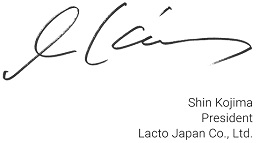
We will strengthen our organizational foundation for sustainable growth
by engaging with all stakeholders in a fair and equitable manner.
It is projected that a protein crisis will occur around 2030, when the supply of protein will fail to meet demand due to global population growth and economic growth in emerging countries. Dairy products are a valuable source of protein and demand for such products is expected to increase even further going forward. However, raw milk production will likely decline in several major production regions around the world due to climate change and other factors. In Japan, the number of dairy farmers continues to decrease due to the aging farming population and the lack of successors as well as the rising cost of feed, energy, and labor. From a food security perspective, this presents a major issue for the country. Aiming to grow sustainably with society through our business activities, we are taking steps to ensure the stable procurement of various dairy raw materials from farms around the world in line with our mission of maintaining a stable supply of dairy products for the Japanese market.
Based on our management philosophy, we have identified and are working to address the following six material issues: supplying safe and reliable food, contributing to a healthy and enriched life, ensuring stable supply through sustainable dairy and livestock farming, adapting to climate change and reducing environmental impact, creating workplaces where diverse human resources can work with pride, and enhancing governance. To strengthen the driving force behind these efforts, we introduced four new policies in September 2024: the Lacto Japan Group Environmental Policy, the Lacto Japan Group Sustainable Procurement Policy, the Lacto Japan Group Information Security Policy, and the Lacto Japan Group Industrial Safety and Health Policy, and also established our new Corporate Sustainability Department thereafter in October 2024.
Our overseas suppliers have a high level of interest in and awareness of sustainability, and in New Zealand, Europe, and other major dairy farming regions, their sustainable dairy farming practices are an added value to our business. With the expectation that awareness of sustainability will increase in Japan as well, we will develop a sales structure and platform that will allow us to respond quickly to such changing needs by utilizing our diverse procurement network and solution capabilities.
We declared “fairness” as our corporate value based on our dedication to continuously engage with all stakeholders, including customers, suppliers, and employees, in a fair and equitable manner and build relationships of trust over the long term. We will continue to advance sustainability initiatives from a long-term perspective rather than just for the sake of short-term interests.
